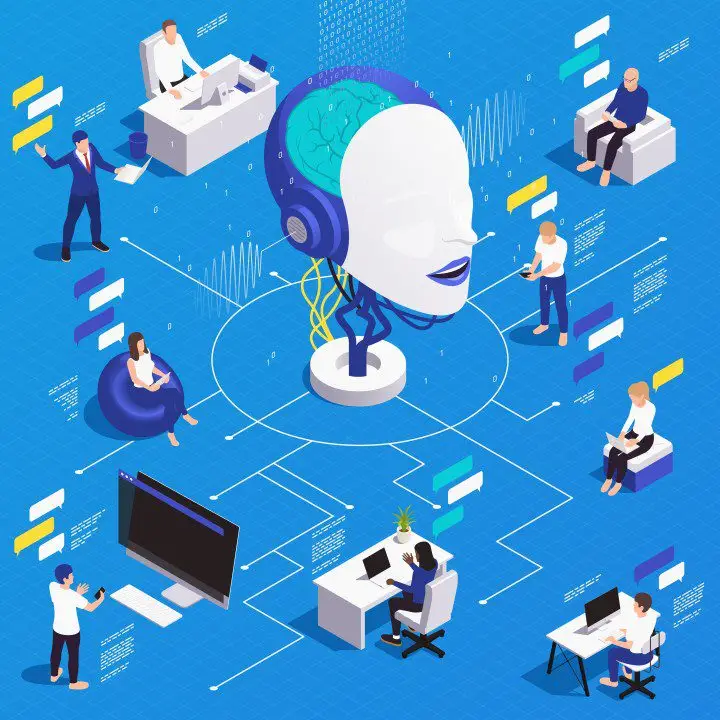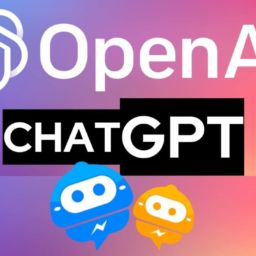
Small businesses are the backbone of many economies around the world. They account for a large share of new job creation and drive innovation and competition. However, small businesses often face challenges due to limited resources and small teams. Emerging technologies like generative AI have the potential to level the playing field for small businesses and help them compete in today's fast-paced business environment.
What Is Generative Ai ?
Generative AI is a type of artificial intelligence or AI system that can create new content, such as text, images, audio, and video, rather than just analyze existing content. It does this by learning from existing data and then using that knowledge to generate new content that is similar to the data it was trained on.
For example, a generative AI model could be trained on a dataset of text articles. It would then learn the patterns of language used in those articles and use that knowledge to generate new articles that are similar in style and content.
Generative AI is a relatively new field, but it has the potential to revolutionize many industries. For example, it could be used to generate personalized content for users, such as news articles, product recommendations, or even creative works like poems or stories. It could also be used to create new products and services, such as virtual assistants or chatbots that can understand and respond to natural language.
Here is a simple analogy to help you understand generative AI:
Imagine you have a bag of LEGO bricks. You can use these bricks to build anything you want, from a simple house to a complex spaceship. Generative AI is like a bag of LEGO bricks, but instead of bricks, it contains pieces of data. Generative AI models can use this data to build new content, just like you can use LEGO bricks to build new structures.
Generative AI is a powerful tool that has the potential to change the world. It is important to understand how it works and how it can be used appropriately, so that we can ensure that it is used for good.
In this article, I will define generative Ai and explore how small businesses can leverage different applications of generative AI to enhance various aspects of their operations and grow their businesses.
Some key examples of generative AI tools and models include:
ChatGPT Language model by OpenAI; Claude developed by Anthropic; and Bard developed by Google that can generate human-like text based on a prompt. They power chatbots and can write stories, poems, code, and more.
DALL-E: Image generation system created by OpenAI that can create realistic images from text descriptions.
Stability: An image generator from Stability AI that can create images in various styles from text prompts.
Midjourney: A platform that uses AI to generate abstract and photorealistic images from text prompts.
Jasper : AI speech synthesis model that can generate human-like speech from text.
MuseNet: A music-generating AI from OpenAI that can compose original songs and instrumental music.
Character: Character AI is a neural language model chatbot that enables users to create characters with distinct personalities and engage in contextual conversations with them
GitHub Copilot: An AI programmer that suggests code completions and entire functions to software developers as they code.
A generative AI can help you tackle various tasks effectively for your business including fresh content creation rather than just recognize patterns in existing data. Depending on how you implement it, the results can be remarkably human-like and creative for your business needs.
Content Creation (with human touch)
AI technology has transformed all-form of content creation, making it faster and cost-effective. However, it’s very crucial to use this technology responsibly and maintain human connections to drive business growth and establish authority. By striking a balance between AI and human creativity, we can create authentic, relatable, and engaging content. While AI tools streamline content creation, infusing content with your voice, emotion, perspective, and storytelling is essential to connect with your audience and drive conversions. Also ensuring ethical practices in Generative AI usage is crucial in any business. Failing to address ethical concerns in your business or with your team can lead to serious repercussions like legal actions and damage to your brand’s image.
One of the biggest potential applications of generative AI for small businesses is automating content creation. Content marketing is essential for small business success, but producing high-quality, original content at scale can be difficult for resource-constrained teams.
Generative AI tools can help small businesses quickly create all types of marketing and advertising content in the voice and style of the company. This includes blog posts, social media posts, emails, landing pages, whitepapers, case studies and more.
For example, tools like Claude, Bard, ChatGPT can generate high-quality content in seconds with just a few prompts. Small businesses can provide keywords, topics, tones of voice and other guiding instructions to the generative AI to get custom-made content tailored to their brand and audience.
This enables small business owners and solo entrepreneurs to run entire content marketing campaigns at a fraction of the time and cost of traditional content creation.
Improving Customer Service
Providing prompt, personalized customer service is vital for small businesses to acquire and retain customers. However, staffing 24/7 customer support or managing influxes of customer inquiries can be challenging with limited team members.
Generative AI chatbots and virtual assistants can help small businesses automate a significant portion of their customer service burden. Tools like Bard and Claude can understand customers’ questions, analyze tone and sentiment, and generate thoughtful, empathetic responses.
Small businesses can train the AI assistants with company and product knowledge so they can answer common customer questions, recommend products/services, provide support across channels like phone, email, live chat, and social media as a virtual team member. This gives small businesses scalable customer support without dedicated staff.
Generating Ideas and Insights
Running a small business requires constant innovation and ideation to stay ahead of larger competitors. Generative AI’s creative capabilities can become an idea factory for small business owners.
Tools like Claude and ChatGPT can brainstorm catchy naming ideas for a new product, generate slogans for an ad campaign, or come up with creative concepts for an event. The AI can produce hundreds of novel, on-brand ideas customized to a small business’ needs in minutes.
Beyond ideation, generative AI can also synthesize insights from data. Small businesses can describe their target demographics, brand persona and business goals to the AI. The AI can then analyze relevant data and patterns to develop data-backed recommendations on pricing strategies, customer acquisition channels, new market opportunities and other key decisions.
Improving Operational Efficiency
Day-to-day operations like bookkeeping, inventory management and HR administration can take up significant time for small business owners. Generative AI tools can help automate mundane, repetitive tasks to boost small business productivity.
For example, small e-commerce businesses can use generative AI services like to optimize inventory levels, flag supply chain issues, generate monthly financial reports, and more based on sales data. Other examples include using AI to screen job applications, schedule interviews, and draft employment contracts to streamline hiring.
Freeing small business owners from hours of daily administrative work enables them to focus their energy on higher value tasks like business strategy, marketing, and customer relationships.
Writing Persuasive Copy
Crafting compelling ad copy and sales messaging is crucial for conversion optimization. However, learning the nuances of persuasive writing and testing message variations takes skill and effort.
Small businesses can leverage generative AI’s advanced language capabilities to A/B test and fine-tune ad copy and landing pages for better results. Ai tools can rapidly generate dozens of high-converting email subject line options or slogan variations for an ad campaign.
The AI can also provide rewriting and editing assistance on sales and marketing materials to improve persuasiveness, clarity, and impact based on small businesses’ goals and target audience. Rather than guesswork, small businesses can use data-driven AI to optimize copy.
Personalizing Customer Experiences
Today’s consumers expect highly personalized experiences. Generative AI can help small businesses deliver personalized messaging and recommendations even without huge marketing budgets.
For example, e-commerce stores can use generative AI tools to customize product recommendations for each visitor based on their on-site behavior and purchase history data. Fashion retailers can offer AI-generated outfit and styling recommendations tailored to customers’ unique tastes. Other examples include personalizing email sequences, onboarding flows and special promotions for VIP customers.
Automating personalization allows small businesses to provide the tailored experiences consumers love from large brands – at scale.
Forecasting and Predicting Trends
Making sound forecasts and predicting industry trends is vital but challenging for small businesses with limited data and resources. Generative AI models can synthesize information from millions of data points to uncover hidden patterns and future trends.
Small business owners can describe their business model, target market and industry to Ai tools. The AI can analyze historical data, economic indicators, industry reports and news articles to deliver data-based insights on forecast demand, future growth opportunities, potential disruptions, and more.
Rather than relying solely on intuition, small businesses can leverage AI to make strategic decisions backed by data-driven market and competitive intelligence.
Overcoming Limited Design Resources
Visuals and graphic design are essential for branding but often require hiring dedicated designers. Generative AI can expand small businesses’ design capabilities without blowing the budget.
Tools like DALL-E can generate unique, high-quality images simply based on text prompts. Small businesses can instantly create custom logos, social media headers, infographics, and other designs. Beyond images, AI design tools like Canva’s Magic Remover can automate tasks like background removal and image editing.
Empowering small businesses to DIY professional graphics and visuals allows them to maintain brand consistency and quality without outsourcing design needs.
Writing SEO-Optimized Content
Ranking high in search engines like Google is key for small business visibility but requires expertise in search engine optimization (SEO). AI tools can optimize content for SEO during the writing process.
Small businesses can provide keywords, target search terms, and topic focus to generative AI tools like Anthropic’s Claude, Bard, ChatGPT. The AI will then produce human-like content optimized for those search terms by organically integrating relevant keywords and phrases in the copy rather than awkwardly stuffing keywords.
The AI can also suggest additional related keywords and questions to target based on search data and trends. This SEO assistance allows small business owners without technical SEO skills to improve website traffic and discovery.
Automating Social Media Management
Maintaining an active social media presence is essential but hugely time-consuming for resource-constrained small businesses. AI tools can fully or partially automate social media activity.
For example, tools like Buffer and Hootsuite can auto-schedule social media posts, including evergreen content created by generative AI. Social media chatbots can respond to common customer inquiries on platforms like Facebook Messenger. More advanced AI can even create original social captions and commentary tailored to each platform’s style.
Automating social posting and interactions frees small businesses from the grind of manual social media management.
Building Chatbots and Virtual Assistants
Conversational interfaces like chatbots and virtual assistants allow small businesses to provide convenient customer support and shopping experiences. However, developing robust conversational AI from scratch requires advanced technical skills.
Pre-built bot platforms like Landbot make it easy for anyone to build chatbots for their website and workflows. Small businesses can use drag-and-drop editors to set up bots to handle customer questions, ecommerce orders, appointment booking, and more. Advanced platforms like Anthropic even allow small businesses to clone human assistance into AI assistants.
Turning manual processes into conversational experiences provides small businesses scalable support and sales capabilities far beyond their team size.
Translation and Localization Assistance
Expanding globally can significantly grow small businesses’ customer base but requires translating content for local markets. Doing accurate translations manually requires substantial language expertise.
AI-powered translation tools like DeepL can automatically localize small businesses’ websites, product listings, marketing materials, and other content into dozens of languages with just a click. This allows small businesses to extend their reach into global markets without outsourcing costly translation projects.
Transcription and Data Entry Automation
Small service businesses like legal and healthcare practices often rely heavily on manual data entry and documentation. AI can automate tedious transcription and data collection to boost productivity.
Tools like Otter.ai can automatically transcribe phone calls, meetings, dictation, and other audio into editable text transcripts. Small businesses can use voice assistants like Siri, Alexa or Google Assistant to take notes, set reminders, and capture other information hands-free. Text processing AI can also extract key information from documents like PDFs and scanned images.
Automating manual data tasks allows small businesses to digitize information with reduced need for manual labor.
Conclusion
Generative AI holds immense potential for empowering small businesses to achieve outsized results. By automating content production, customer interactions, design and other business functions, AI gives small teams big company-like capabilities. Small businesses that leverage AI early can gain a competitive edge in their industries.
With rapid advances in generative AI, we are just scratching the surface of transformative applications for small businesses. But even today’s technology can already save small teams countless hours and unlock new growth opportunities. By augmenting their capabilities with AI, small businesses can overcome resource constraints and maximize their chances of success.






